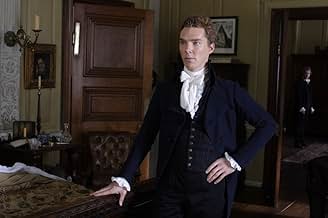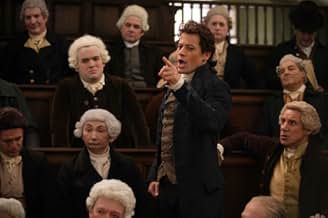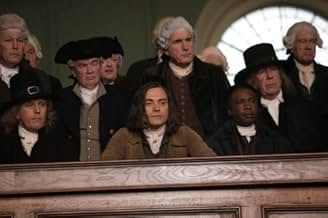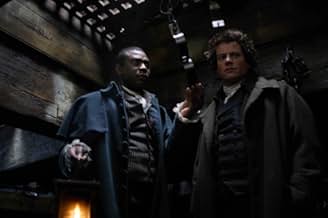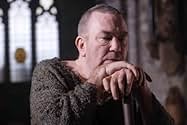NOTE IMDb
7,4/10
26 k
MA NOTE
Ajouter une intrigue dans votre langueThe idealist William Wilberforce maneuvers his way through Parliament, endeavoring to end the British transatlantic slave trade.The idealist William Wilberforce maneuvers his way through Parliament, endeavoring to end the British transatlantic slave trade.The idealist William Wilberforce maneuvers his way through Parliament, endeavoring to end the British transatlantic slave trade.
- Réalisation
- Scénario
- Casting principal
- Récompenses
- 3 victoires et 6 nominations au total
Ciarán Hinds
- Lord Tarleton
- (as Ciaran Hinds)
Avis à la une
Most people probably have vaguely heard of William Wilberforce without knowing too much about his life. The power of his story, and the power of the central issue (the abolition of slavery), carries this movie that veers from artful to clumsy.
The movie can be confusing, as it moves back and forth between phases of Wilberforce's life. Often I found myself wondering for a few moments, "When is this?" Also, much of the political intrigue has to be inferred, since the backgrounds of the various players - particularly Wilberforce's adversaries - are not adequately explained.
However, the performances are quite good, some bordering on excellence. Some might argue that the villains are too simplistically presented, but on an issue like slavery, it is expected that the opposition would be completely unsympathetic (just as Nazis are rarely presented with any hint of sympathy).
I am sure the writers took some liberties with history. By the way, the tune we now associate with the hymn "Amazing Grace" did not become the melody for John Newton's famous lyrics until after Wilberforce's death.
I just watched this movie at a private screening for attendees of the National Prayer Breakfast in Washington, DC (clergy are a natural audience for this movie). The reception was favorable, but this was an audience for which the moralizing of the story would naturally resonate. I'm not sure it will attract a very broad audience - this is a movie that may well find its niche on DVD being shown in high school history classes and at church gatherings.
It is a nice, historical, period piece. It is (largely due to subject matter) reminiscent of "Amistad", with similar pacing.
Should you see it? It depends on whether you like this TYPE of movie. If this genre (historical drama) interests you, this is quite well-done. It might even inspire you to read more about Wilberforce. Go see it. If you are in search of movies that teach lessons about good values and perseverance in fighting for what's right, go see it.
But if you have no idea when the French Revolution occurred relative to our War of Independence, and if it doesn't come naturally to you to remember that the newborn U.S. was allied with France against Britain during that period - and if you don't care - this movie might not be your idea of a fun time.
If I were the producers, I would add one of those "scrolling text" historical introductions to the film before final release, though it is probably too late.
The movie can be confusing, as it moves back and forth between phases of Wilberforce's life. Often I found myself wondering for a few moments, "When is this?" Also, much of the political intrigue has to be inferred, since the backgrounds of the various players - particularly Wilberforce's adversaries - are not adequately explained.
However, the performances are quite good, some bordering on excellence. Some might argue that the villains are too simplistically presented, but on an issue like slavery, it is expected that the opposition would be completely unsympathetic (just as Nazis are rarely presented with any hint of sympathy).
I am sure the writers took some liberties with history. By the way, the tune we now associate with the hymn "Amazing Grace" did not become the melody for John Newton's famous lyrics until after Wilberforce's death.
I just watched this movie at a private screening for attendees of the National Prayer Breakfast in Washington, DC (clergy are a natural audience for this movie). The reception was favorable, but this was an audience for which the moralizing of the story would naturally resonate. I'm not sure it will attract a very broad audience - this is a movie that may well find its niche on DVD being shown in high school history classes and at church gatherings.
It is a nice, historical, period piece. It is (largely due to subject matter) reminiscent of "Amistad", with similar pacing.
Should you see it? It depends on whether you like this TYPE of movie. If this genre (historical drama) interests you, this is quite well-done. It might even inspire you to read more about Wilberforce. Go see it. If you are in search of movies that teach lessons about good values and perseverance in fighting for what's right, go see it.
But if you have no idea when the French Revolution occurred relative to our War of Independence, and if it doesn't come naturally to you to remember that the newborn U.S. was allied with France against Britain during that period - and if you don't care - this movie might not be your idea of a fun time.
If I were the producers, I would add one of those "scrolling text" historical introductions to the film before final release, though it is probably too late.
I had the pleasure this past week of seeing a pre-screening outside of Washington, D.C. of the movie Amazing Grace, starring Reed Richards...err...Ioan Gruffudd as William Wilberforce the famous British Christian politician that helped end the slave trade in Great Britain in the early 18th Century. The movie progresses through Wilberforce's life from about the time he begins his crusade against the slave trade in Parliament in his early 20's to the time it is eventually abolished. Everything in between is composed of all the hardships, victories, and relationships he goes through in the meantime. At some points the story can be a bit yawn inducing, but the film consistently seems to add just the right amount of humor or political intrigue to keep it afloat (more on the pacing below). There is a love interest Barbara, played by the quite attractive and dynamic Romola Garai, who keeps Mr. Fantastic...err...Wilberforce on track and encouraged. You get the feeling he would've never made it through the hard times without her (which is probably the case for most successful men as they say). The film does delve into evils of the slave trade, but it doesn't focus specifically on it, much like Amistad did focus on it. It seems to keep the main goal in mind, abolishing that heinous evil. This gives the film a "glass half full" feeling instead of a "glass half empty" one. You find yourself cheering for the good guys instead of seeking the heads of the bad ones.
You may be thinking they should've just called this film "Amistad: The Prequel", but that would do it a great disservice. Where Amistad succeeded in many ways such as exposing the horror of the slave trade in much more visual and visceral detail and containing great acting by Djimon Hounsou and Anthony Hopkins, I feel you ultimately left the theater not really feeling much better about anything. In fact, I'd say you may have left if feeling worse, maybe even shameful and/or guilty. Amazing Grace doesn't feel like that. In fact, it's not even really a "feel good" movie; it transcends that status. It's really a "do good" movie. You almost feel personal empowerment from the story, like you want to go out and change some social injustice yourself! Sure, we don't all have the political clout of a William Wilberforce, but we do have a voice. And I think that's why Amazing Grace stands above previous "social injustice" films like it. It feels organic instead of static. It feels like it could apply to today instead of some time long forgotten. It also appeals to everyone; black, white, or whoever. One African-American in the audience mentioned how he was impressed and encouraged at how passionate these white men were for the plight of the slaves. You also realize that slavery wasn't just an American problem, it was a world problem; which further emphasized the fact that the social injustice we see today isn't just a "fill_in_the_blank" problem, it's a world problem.
I'm not knowledgeable enough to comment very much on the technical aspects of this film, but don't let the religious overtones fool you into thinking this is another technical mess like so many in the past. It is on par with any period film of its kind from Hollywood in almost every way; acting, set design, costume design, story, etc.
One thing I found a drawback to it was its pacing though. It starts off fairly tepid, and though it builds up, it seems to go through a cycle of building up and then falling back down again. This could ultimately be a good thing though, because if you can keep your focus throughout the film, you'll be in for a very powerful ending that evokes positive emotions you didn't think you had, and I think the cyclic nature of the film's progress enhances the fulfillment the ending provides. I also found the time period jumping around within the film to be a bit confusing at some points; like some scenes I didn't know if they were in the past or present.
The representative at the screening said the movie would be playing on about 850 screens nationwide on its opening weekend (Feb. 23). Though this is small compared to most major movies, it is a pretty good amount for a smaller movie like this. I recommend going to see it if you're interested in a movie with depth, passion, character, goodness, virtue, and victory. Does it entertain? Sure. But it seems to do a little more also. You can't say that about too many movies these days. You won't leave wishing you had that $8.50 back.
In case you're wondering about the title, John Newton, the composer of the famous hymn 'Amazing Grace', (played powerfully by Albert Finney), was a contemporary and friend of William Wilberforce. John Newton was also a reformed ex-slave trader.
You may be thinking they should've just called this film "Amistad: The Prequel", but that would do it a great disservice. Where Amistad succeeded in many ways such as exposing the horror of the slave trade in much more visual and visceral detail and containing great acting by Djimon Hounsou and Anthony Hopkins, I feel you ultimately left the theater not really feeling much better about anything. In fact, I'd say you may have left if feeling worse, maybe even shameful and/or guilty. Amazing Grace doesn't feel like that. In fact, it's not even really a "feel good" movie; it transcends that status. It's really a "do good" movie. You almost feel personal empowerment from the story, like you want to go out and change some social injustice yourself! Sure, we don't all have the political clout of a William Wilberforce, but we do have a voice. And I think that's why Amazing Grace stands above previous "social injustice" films like it. It feels organic instead of static. It feels like it could apply to today instead of some time long forgotten. It also appeals to everyone; black, white, or whoever. One African-American in the audience mentioned how he was impressed and encouraged at how passionate these white men were for the plight of the slaves. You also realize that slavery wasn't just an American problem, it was a world problem; which further emphasized the fact that the social injustice we see today isn't just a "fill_in_the_blank" problem, it's a world problem.
I'm not knowledgeable enough to comment very much on the technical aspects of this film, but don't let the religious overtones fool you into thinking this is another technical mess like so many in the past. It is on par with any period film of its kind from Hollywood in almost every way; acting, set design, costume design, story, etc.
One thing I found a drawback to it was its pacing though. It starts off fairly tepid, and though it builds up, it seems to go through a cycle of building up and then falling back down again. This could ultimately be a good thing though, because if you can keep your focus throughout the film, you'll be in for a very powerful ending that evokes positive emotions you didn't think you had, and I think the cyclic nature of the film's progress enhances the fulfillment the ending provides. I also found the time period jumping around within the film to be a bit confusing at some points; like some scenes I didn't know if they were in the past or present.
The representative at the screening said the movie would be playing on about 850 screens nationwide on its opening weekend (Feb. 23). Though this is small compared to most major movies, it is a pretty good amount for a smaller movie like this. I recommend going to see it if you're interested in a movie with depth, passion, character, goodness, virtue, and victory. Does it entertain? Sure. But it seems to do a little more also. You can't say that about too many movies these days. You won't leave wishing you had that $8.50 back.
In case you're wondering about the title, John Newton, the composer of the famous hymn 'Amazing Grace', (played powerfully by Albert Finney), was a contemporary and friend of William Wilberforce. John Newton was also a reformed ex-slave trader.
This is a lovely, moving and intelligent film. I did not detect any notably weak performances among a remarkable cast. The older actors though, Michael Gambon and Albert Finney, were shameless scene stealers, but one can hardly fault them for their excellence. There were many things to like about this film. It was gorgeous to look at, brilliantly capturing the look and sound of a sumptuous age. The pacing and editing were fine, though the device using flashbacks for most of the film occasionally led to a moments confusion about when a scene was supposed to be taking place. And the story itself is quite inspirational. A note for my Canadian readers and the Canadians who attended the TIFF screenings. The film mostly covered the struggle to outlaw slavery in Britain itself, though they did touch on Wilberforce's efforts to have it outlawed throughout the British Empire. This continued in the years after the conclusion of the film, and a Bill to do just that was passed in 1833, a month after Wilberforce died. So the film we watched was very much about our own history, and the story of the abolition of slavery in Britain directly affected the eventual abolition of slavery in Canada.
Ioan Gruffudd in Amazing Grace, Michael Apted's new masterpiece - what can I say? The man delivered his usual brilliant performance. What made this one better than all the rest? Why do I think Oscar when I think of his part? Every moment he was on screen drew you deeper and deeper into identifying with William Wilberforce until at the end, when he finally achieves his life's work, you want to clap right along with the people applauding him on screen! When he suffers, you suffer right along with him. From the wry twist of his lips to the pain and devastation in his eyes to the fervent body language as he makes point after impassioned point, you are right there living Wilberforce's life.
The most charming parts were fodder provided by the fabulous screen writing and brought to electric life by Ioan Gruffudd as impassioned Wilberforce, Benedict Cumberpatch as driven and farseeing William Pitt, P.M., Romola Garai as Wilberforce's zesty and feisty wife Barbara and the surprisingly fantastic delivery by Jeremy Swift as Ioan's long-suffering wise butler. Jeremy has a way of delivering a comic line with a punch to your chest that bursts into laughter! Benedict and Ioan have clear chemistry as friends with a vision for the future. You can't help but believe these two would choose to be brothers if they could. But the best and most connected relationship was between Ioan as Wilberforce and Romola as his wife. You could feel the way they were already together even while their characters were still protesting on screen.
Michael Apted riveted the audience, bringing to life politics in a way that made you wish you could run out and find a cause of your own to champion. Again, I say Oscar. I have rarely attended a movie where the audience clapped to the point of hurting their fingers with the thunder they were creating for so bloody long! Entirely throughout the actor credits the audience applauded, only varying the volume for those performances they particularly appreciated. Ioan Gruffudd, Benedict Cumberpatch, Romola Garai, Jeremy Swift, Michael Gambon, and Albert Finney.
All in all, a tour de force movie that should impact everyone with the IMPORTANCE of trying to change that which is NOT RIGHT.
Congratulations to everyone who worked on Amazing Grace. Truly, wonder was on screen today.
The most charming parts were fodder provided by the fabulous screen writing and brought to electric life by Ioan Gruffudd as impassioned Wilberforce, Benedict Cumberpatch as driven and farseeing William Pitt, P.M., Romola Garai as Wilberforce's zesty and feisty wife Barbara and the surprisingly fantastic delivery by Jeremy Swift as Ioan's long-suffering wise butler. Jeremy has a way of delivering a comic line with a punch to your chest that bursts into laughter! Benedict and Ioan have clear chemistry as friends with a vision for the future. You can't help but believe these two would choose to be brothers if they could. But the best and most connected relationship was between Ioan as Wilberforce and Romola as his wife. You could feel the way they were already together even while their characters were still protesting on screen.
Michael Apted riveted the audience, bringing to life politics in a way that made you wish you could run out and find a cause of your own to champion. Again, I say Oscar. I have rarely attended a movie where the audience clapped to the point of hurting their fingers with the thunder they were creating for so bloody long! Entirely throughout the actor credits the audience applauded, only varying the volume for those performances they particularly appreciated. Ioan Gruffudd, Benedict Cumberpatch, Romola Garai, Jeremy Swift, Michael Gambon, and Albert Finney.
All in all, a tour de force movie that should impact everyone with the IMPORTANCE of trying to change that which is NOT RIGHT.
Congratulations to everyone who worked on Amazing Grace. Truly, wonder was on screen today.
What follows is the text of a letter I composed for my parish bulletin (I am a priest and pastor of a University Parish in Tucson) after having seen Amazing Grace. I often recommend movies to my parishioners, but seldom write a full-fledged review. This weekend I made an exception for an exceptional movie.
Dear Friends,
It is a movie-lovers' favorite weekend: Oscar weekend. So I beg your indulgence as I offer not just a movie recommendation, but an actual review of the remarkable movie I saw on Friday. I had been hearing about it for several weeks and looking forward to its opening in Tucson. "Amazing Grace" tells the story of William Wilberforce, a young American Revolution era British Parliamentarian who waged a three-decade legislative battle to end Great Britain's involvement in the African slave trade (Slavery was outlawed in England six decades before our civil war.) Among those who had influenced this remarkable Englishman was John Newton, the slave ship captain turned evangelical preacher, who penned the lyrics of arguably the best known sacred song in the world, which also lends its title to the movie. Newton had known Wilberforce as a child and, in the film, serves as his conscience when the task is unclear or proves daunting..
This is no schmaltzy feel-good biopic. Everything about it is compelling. It is beautifully written and directed. The cinematography and film-editing are superb. The costume and sets are exquisite. And the acting is top-notch. Ioan Gruffudd, the young Welchman best known for his excellent portrayal of C.S. Forester's seafaring hero, Horatio Hornblower, in eight made-for-A&E movies (1998-2003), brings great depth and passion to his portrayal of this complex hero of social justice. Gruffudd's star is on the rise. Awardwinning actor, Albert Finney, graces this picture as an aged and eccentric Newton. The cast is rounded out by a gaggle of veteran British character actors who lend profundity to this compelling story. In addition to the cinematic elements that make this one of the few movies I have seen that I consider to be worth the $9 it costs to see a movie these days, it is first-rate storytelling! And Wilberforce is a hero whose story must be told. He grappled with one of my favorite issues: the place of faith in public life. As a young man, the rising political star began to rediscover an intense faith that had lain dormant for a time. His fire of conviction that something must be done about the slave trade was fueled by this reemerging faith. As he struggled with whether he should use his oratorical talents a politician or a preacher, he is convinced that he can use his popularity as an MP to do God's work by actively advocating for the voiceless slaves. The movie presents the story of a man who finds a perfect balance between his faith and his public lifeeach shaping the other in the face of a clear vocation. That his secular realm is that of politics and the time is one of great fear and institutionalized injustice gives this period movie much relevance in today's world. I hope every person of faith watches this movie. I especially think that it is pertinent for our student parishioners who may be struggling with the same issues as Wilburforce. (While I fear it would bore younger children, it would be good for older children and teens.) It opened on Friday at the El Con Cinema. I will be organizing a parish outing to see "Amazing Grace" in a couple of weeks. Whether you go then or another time, I recommend this movie as a great Lenten exercise. I loved it and consider it one of the most socially relevant films I've ever seen. "Amazing Grace" has long been one of my favorite sacred songs, but I will never hear it the same again.
Peace, Fr. Bart
Dear Friends,
It is a movie-lovers' favorite weekend: Oscar weekend. So I beg your indulgence as I offer not just a movie recommendation, but an actual review of the remarkable movie I saw on Friday. I had been hearing about it for several weeks and looking forward to its opening in Tucson. "Amazing Grace" tells the story of William Wilberforce, a young American Revolution era British Parliamentarian who waged a three-decade legislative battle to end Great Britain's involvement in the African slave trade (Slavery was outlawed in England six decades before our civil war.) Among those who had influenced this remarkable Englishman was John Newton, the slave ship captain turned evangelical preacher, who penned the lyrics of arguably the best known sacred song in the world, which also lends its title to the movie. Newton had known Wilberforce as a child and, in the film, serves as his conscience when the task is unclear or proves daunting..
This is no schmaltzy feel-good biopic. Everything about it is compelling. It is beautifully written and directed. The cinematography and film-editing are superb. The costume and sets are exquisite. And the acting is top-notch. Ioan Gruffudd, the young Welchman best known for his excellent portrayal of C.S. Forester's seafaring hero, Horatio Hornblower, in eight made-for-A&E movies (1998-2003), brings great depth and passion to his portrayal of this complex hero of social justice. Gruffudd's star is on the rise. Awardwinning actor, Albert Finney, graces this picture as an aged and eccentric Newton. The cast is rounded out by a gaggle of veteran British character actors who lend profundity to this compelling story. In addition to the cinematic elements that make this one of the few movies I have seen that I consider to be worth the $9 it costs to see a movie these days, it is first-rate storytelling! And Wilberforce is a hero whose story must be told. He grappled with one of my favorite issues: the place of faith in public life. As a young man, the rising political star began to rediscover an intense faith that had lain dormant for a time. His fire of conviction that something must be done about the slave trade was fueled by this reemerging faith. As he struggled with whether he should use his oratorical talents a politician or a preacher, he is convinced that he can use his popularity as an MP to do God's work by actively advocating for the voiceless slaves. The movie presents the story of a man who finds a perfect balance between his faith and his public lifeeach shaping the other in the face of a clear vocation. That his secular realm is that of politics and the time is one of great fear and institutionalized injustice gives this period movie much relevance in today's world. I hope every person of faith watches this movie. I especially think that it is pertinent for our student parishioners who may be struggling with the same issues as Wilburforce. (While I fear it would bore younger children, it would be good for older children and teens.) It opened on Friday at the El Con Cinema. I will be organizing a parish outing to see "Amazing Grace" in a couple of weeks. Whether you go then or another time, I recommend this movie as a great Lenten exercise. I loved it and consider it one of the most socially relevant films I've ever seen. "Amazing Grace" has long been one of my favorite sacred songs, but I will never hear it the same again.
Peace, Fr. Bart
Le saviez-vous
- AnecdotesDuring the scene in which William Wilberforce (Ioan Gruffudd) sings "Amazing Grace" at the card house, the singing was performed live by Gruffudd. In the previous several takes, a playback had been used, but it is Gruffudd singing in the final film. Director Michael Apted had no idea whether or not Gruffudd could actually sing. Little did he know, Gruffudd is an accomplished soloist and choir singer. With a little practice, Gruffudd performed for the first time on-set while the cameras were rolling, all much to the surprise of the cast, crew, and director.
- GaffesThere were at least 3 grammar mistakes: several uses of "I" when "me" should have been used. Wilburforce also says "By who?" As a graduate of Cambridge, he would have said, "By whom?"
- Citations
John Newton: Although my memory's fading, I remember two things very clearly. I'm a great sinner and Christ is a great Savior.
- ConnexionsFeatured in Tavis Smiley: Épisode datant du 23 janvier 2007 (2007)
Meilleurs choix
Connectez-vous pour évaluer et suivre la liste de favoris afin de recevoir des recommandations personnalisées
- How long is Amazing Grace?Alimenté par Alexa
Détails
- Date de sortie
- Pays d’origine
- Site officiel
- Langue
- Aussi connu sous le nom de
- Ân Điển Diệu Kỳ
- Lieux de tournage
- Sociétés de production
- Voir plus de crédits d'entreprise sur IMDbPro
Box-office
- Montant brut aux États-Unis et au Canada
- 21 250 683 $US
- Week-end de sortie aux États-Unis et au Canada
- 4 305 000 $US
- 25 févr. 2007
- Montant brut mondial
- 32 120 360 $US
- Durée1 heure 58 minutes
- Couleur
- Mixage
- Rapport de forme
- 1.85 : 1
Contribuer à cette page
Suggérer une modification ou ajouter du contenu manquant

Lacune principale
By what name was Amazing Grace (2006) officially released in India in English?
Répondre




